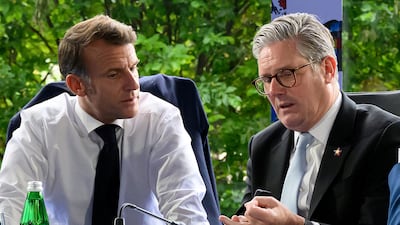Live updates: Follow the latest on Israel-Iran conflict
Europe’s cautious diplomacy is being tested by the Israel-Iran conflict as it seeks de-escalation with allies in the Middle East, while acknowledging the threats of Iran’s nuclear programme.
The past two days have seen a flurry of calls between European and Gulf leaders and diplomats, as the possibility of all-out war leaves countries with “difficult calculations" to make.
The rapidly escalating conflict is likely to be at the top of the agenda of the annual G7 summit that opens in Canada on Sunday, alongside US tariffs and the war in Ukraine.
Before flying out to Canada, British Prime Minister Keir Starmer spoke to the Crown Prince of Saudi Arabia, Mohammed bin Salman. The pair discussed the “gravely concerning situation” and agreed on the need to de-escalate," Downing Street said.
“The Prime Minister updated on his conversations with partners so far and reiterated that the UK is poised to work closely with its allies in the coming days to support a diplomatic resolution," the statement said.
This followed a call between Mr Starmer and Israeli premier Benjamin Netanyahu in the immediate aftermath of the strikes on Friday.
Yet Mr Starmer, alongside French and German leaders, has also spoken about the “great concerns” he has over Iran’s nuclear programme and the threat it poses to Israel.
“It’s obvious that for a long time we’ve had great concerns about the Iranian nuclear programme,” he told Bloomberg on Friday. “I do recognise Israel’s right to self defence, but I’m very concerned.”
French President Emmanuel Macron and Italian premier Giorgia Meloni also spoke with the Saudi Crown Prince before making their way to the summit.
“The two sides … affirmed the need to exert all possible efforts for de-escalation, restraint, and resolving all disputes through diplomatic means,” the Saudi Foreign Ministry said in a statement about the call with Mr Macron.
Mr Macron and Ms Meloni also held separate conversations with UAE President Sheikh Mohamed.
"They underscored the need for maximum restraint and for intensifying efforts to de-escalate tensions and resolve disputes through diplomatic means that preserve the region’s security and stability,” Wam reported on Saturday.
European countries are seeking to deter Iran from its pursuit of a nuclear weapon, without being dragged into war.
The UK and France were involved in the last exchanges between Iran and Israel, when their air forces shot down drones fired by Iran in April 2024, and to a more limited extent in October 2024, during a ballistic missile attack by Tehran.
“Everybody at the moment is trying to stay out of this,” said Sir John Jenkins, a former UK Ambassador to Saudi Arabia. “It’s an incredibly difficult calculation”.
Saudi Arabia normalised relations with Iran in 2023, after decades of hostility.
Both Saudi Arabia and the UAE condemned Israel’s strikes on Friday, but Iran’s nuclear ambitions and its ballistic missiles programme have long cast a shadow over the region.
Iran’s neighbouring countries take an alternative view of progress and are pursuing the long term visions of diversifying their economies and attracting foreign investment, Mr Jenkins said.
The diplomatic track pursued by Saudi Arabia had succeeded for a time in keeping US support for the Israeli campaign at bay.
“The Saudis played this cleverly by distancing themselves from the Israeli position,” he said.
US President Donald Trump’s recent visit to Saudi Arabia and the UAE, where the US agreed to set up major AI data processing centres, was an “indication of where (both countries) want to be in the future”.
“People aren't going to invest in what look like war zones," he said.
But the extent to which Iran’s neighbours and Europe can stay out of the war will depend on developments in the coming days.
"Everybody is going to try to minimise their own exposure to the impact of the current conflict. But whether they're going to be successful depends on how this now plays out," Mr Jenkins said.


